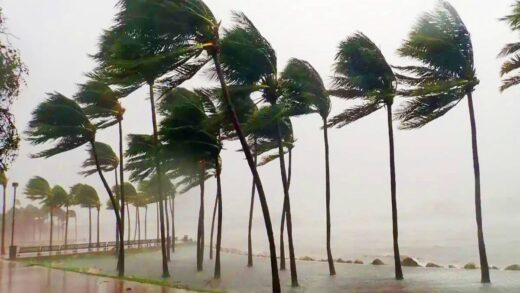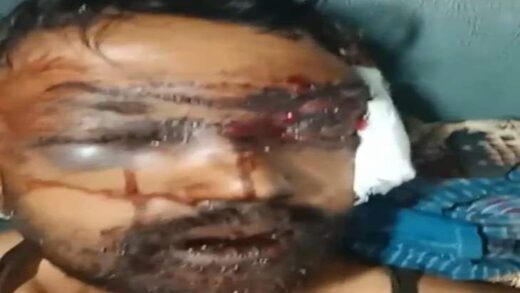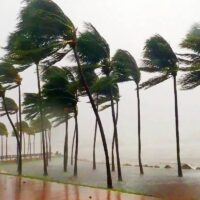SPECIAL REPORT — In a year of world-changing events – from the Middle East to Ukraine, cyberattacks to undersea cable attacks, and much more – The Cipher Brief was blessed to have had dozens of top U.S. national security officials and global experts join us on our stage.
That “stage” included a banner edition of our annual Threat Conference, summits of our Cyber Initiatives Group, and the first-ever Cipher Brief honors dinner – along with a steady collection of interviews on our virtual platform.
At year’s end, we share below a list of some of the more memorable conversations, along with links to the full versions. And we thank all those who gave their time and insights; and all of you for reading and providing feedback.
A year in the making: a conversation with the head of the CIA
Central Intelligence Agency (CIA) Director William Burns doesn’t give many interviews; and when he does, they are rarely as long or sweeping in nature as the conversation he had with Cipher Brief CEO Suzanne Kelly on the stage at this year’s Threat Conference. The two spoke for nearly an hour, and Burns took questions afterwards from our audience. The conversation and Q&A session spanned the globe, covering “long-range challenges” posed by China, Russia, the wars in the Middle East, terrorism and other threats – along with Burns’ personal reflections on nearly four years on the job as head of the CIA and a long career as a global diplomat.
When Kelly asked which he preferred – the job of top diplomat or top spy, Burns didn’t hesitate.
“What I do now,” he said. “I say that with great affection for my old institution and my old profession, but as I said, I genuinely love this job.”
Burns’s appearance came exactly one year to the day after he was to have joined us for the 2023 Threat Conference. That day happened to have been October 7 – the date of Hamas’s attack in Southern Israel. Burns sent his regrets then, and one year later, he made good on his “rain check.” The one-year anniversary of the attacks – and the wars that have followed – hung over the CIA Director’s remarks.
Burns — who has been personally involved in long-running ceasefire negotiations and was back in Doha, Qatar last week for the latest round of talks — urged leaders in the region “to recognize that enough is enough, that perfect is rarely on the menu, especially in the Middle East,” highlighting the “human stakes” faced by the Israeli victims and hostages and their families, and the dead and wounded civilians in Gaza.
On Ukraine, Burns warned of “enormous challenges ahead” for the Ukrainian people, and cautioned the U.S. against “attention deficit disorder” in terms of supporting Kyiv for the long term. When asked about Russia’s nuclear arsenal and President Vladimir Putin’s red-line threats to use it, Burns said, “We can’t take that lightly…but you have to be careful not to be unnecessarily intimidated” by what he described as repeated nuclear “saber rattling” by the Russian leader.
There was much more, an you can find it here and/or watch Burns’ appearance on our program The World Deciphered.
NSA Director – on the ‘greatest challenge of our time’
CIA Director Burns topped a long list of national security leaders who joined our 2024 Threat Conference. Among them was General Timothy D. Haugh, who wears the dual hats of Director of the National Security Agency (NSA) and Commander of U.S. Cyber Command (USCYBERCOM). Gen. Haugh offered remarks and took audience questions, focusing on a range of threats emanating from China, which he said pose “an unprecedented challenge… the greatest challenge of our time.” Given his position, Gen. Haugh focused on China-linked threats in cyberspace – a particularly timely subject, given that news had just broken of the cyber actor now known as “Salt Typhoon” that was found to have breached the networks of telecommunications companies AT&T, Verizon, and Lumen Technologies. The hackers, who were traced to China, appeared to have targeted the devices of top officials, including the phone of President-elect Donald Trump, and captured information about federal wiretap investigations.
“China has the world’s largest cyberspace operations workforce,” Gen. Haugh warned, “engaged every day in a deliberate campaign to steal our technology and target.”
The NSA director urged greater public-private sector cooperation to counter the threat — what he called a “whole-of-nation response.”
“It will take actions on the part of our entire country, government, industry, and academia all moving as one to respond to the sweeping approach being carried out by PRC cyber actors.”
For more on Gen. Haugh’s appearance at the Threat Conference, read in The Cipher Brief or watch on our YouTube channel. Also check out The Cipher Brief’s coverage of Gen. Haugh’s update on the Chinese cyber threat from earlier this month.
Chinese cyberattacks are the ‘tip of the iceberg’
If Gen. Haugh’s warnings weren’t sobering enough, a conversation two months later gave us fresh reason to pause.
This one came at the Winter Summit of our Cyber Initiatives Group in early December, which covered the year’s top cyber threats, issues and opportunities of the year. Here the headline guest was Cybersecurity and Infrastructure Security Agency (CISA) Director Jen Easterly, and while she offered a review of the “Salt Typhoon” breach and other cybersecurity concerns, she also warned that “Salt Typhoon” likely represented only the “tip of the iceberg” when it comes to China-based cyberattacks against U.S. critical infrastructure. Those attacks, she said, are aimed not only at the theft of ideas and information; increasingly, Easterly said, they are cyber probes meant to sow the seeds of future disruptions in the event of a U.S.-China conflict.
“This is a world where a war in Asia could see very real impacts to the lives of Americans across our nation, with attacks against pipelines, against water facilities, against transportation nodes, against communications, all to induce societal panic,” Easterly said.
Given the severity of the threat, Easterly added that she wished these cyberattacks had been given different names.
“I wish I hadn’t ever heard any of these names, like ‘Volt Typhoon,’ ‘Salt Typhoon,’ ‘Midnight Blizzard,’ ‘Tempest Panda’… that really glorify these villains that frankly want to do enormous harm to the United States of America,” she said. “And so, I’m on a mission to try and rename some of these bad actors to things like ‘Weak Weasel’ and ‘Doofus Dingo.’”
Read more of the conversation, including Easterly’s advice for her successor, in The Cipher Brief, or watch it on our YouTube channel.
Looking for a way to get ahead of the week in cyber and tech? Sign up for the Cyber Initiatives Group Sunday newsletter to quickly get up to speed on the biggest cyber and tech headlines and be ready for the week ahead. Sign up today.
Something worse than a ‘Cold War’ with China?
We could have filled this entire post with the insight-rich conversations from the October Threat Conference, and we come back to it here for one more deep dive with a top official from the U.S. intelligence community.
Few top IC officials understand China as well as Michael Collins, Acting Chair of the National Intelligence Council, who has spent the better part of three decades working on East Asia. In a conference session with Cipher Brief Managing Editor Tom Nagorski, Collins offered a view of China and the U.S.-China relationship that married the wisdom of a scholar with the experience of a longtime IC leader.
He said the U.S.-China relationship was not yet in “Cold War” territory, but was better understood as a “great power competition” or “systems competition.” While that not-a-Cold-War-yet assessment might have made us feel better for a moment, Collins also had this to say: the current clash with China is “more severe, more complex, even if not as militarized, as the original Cold War,” given that the U.S. is going up against a country with far greater economic power and international clout than the Soviet Union ever had.
Read more from the conversation in The Cipher Brief.
From the NCTC Chief, an “exit interview”
Christine Abizaid was sworn in as Director of the National Counter-Terrorism Center (NCTC) in June of 2021, and gave her first public interview as director to The Cipher Brief. Back then, she spoke about the changing terrorist threats to America, which she called “ideologically diverse.”
It was only fitting, then, that three years later, as Abizaid prepared for her departure from the NCTC, she met with The Cipher Brief once more, this time for an exclusive exit interview.
Abizaid offered a range of reflections on the job, and on a threat environment that has changed dramatically since the 9/11 attacks – and isn’t any less complex.
“It’s not at all like what we dealt with immediately after 9/11,” Abizaid said. “It’s very different than when ISIS came onto the scene after having declared a global caliphate. It is no less complicated, no less concerning, and you want our intelligence agencies, our law enforcement agencies, our border security and homeland security agencies, to be focused like a laser on preventing the effects of terrorism in the United States homeland and globally.”
For all the challenges – we spoke with Abizaid amid a resurgence of the Islamic State (IS) and a documented rise in jihadist terror inspired by Israel’s war in Gaza – she was hopeful that her agency and the national security community writ large was in a good position to manage the threat.
“I hope the average American doesn’t have to think about the terrorism threat today as much as they had to in previous decades, in part because we’ve done a good job as the United States government across successive administrations in keeping that threat at bay,” Abizaid told us. “The way I think about it is, let’s not have the public have to worry about this — let’s make it the job of the counterterrorism enterprise to have to worry about it.”
Read her interview in The Cipher Brief and listen to it on The State Secrets podcast on Apple Podcasts or Spotify.
The first “Spy Prom”
The Cipher Brief held its inaugural Honors Dinner on April 18 in Washington D.C. – an event dubbed “Spy Prom” by former Congressman Will Hurd, given the range of honorees and other special guests who joined us from the Intelligence Community. The event recognized professionals from different backgrounds who have made significant contributions to the national and global security dialogue.
While the honorees were all impressive — CIA Director William Burns; Oksana Markarova, Ukraine’s Ambassador to the U.S.; Susan Gordon, former Principal Deputy Director of National Intelligence at the Office of the Director of National Intelligence; Cipher Brief Senior National Security Columnist Walter Pincus; and screenwriter Howard Gordon — we note here an opening address at the event given by Dr. Michael Vickers, who served as Under Secretary of Defense for Intelligence from 2011 to 2015.
Vickers offered a tour of the global landscape of security risks – what he described as a dangerous world that’s getting more dangerous all the time. “We haven’t faced an international environment this challenging since the early Cold War,” Vickers said, and by the time he’d finished his remarks, it was hard to argue the point. From Russia to China to the “revolution in technology even more powerful than the industrial and nuclear revolutions,” Vickers argued the need for vigilance. A lot to digest at a black-tie event — but the right tone for an event that honored those who have worked to mitigate the risks and dangers.
Read more from Vickers’ opening remarks here, and find out more about The Honors Dinner here. You might wish to join us at the 2025 edition.
Apply now for your seat at The Cipher Brief Honors Dinner, the most glamourous spy dinner of the year.
Live from Taiwan, a former Naval Intelligence Chief
For all the current threats to national and global security, China’s assertiveness and longer-term ambitions around Taiwan hang over any conversations involving global threats. In 2024, China held military exercises near Taiwan after the May inauguration of President Lai Ching-te; and in mid-December, Taipei said Beijing conducted its largest maritime operations in the region in almost three decades, days after Lai made a Pacific tour that included stops in Guam and Hawaii.
Former Rear Admiral Mike Studeman, who served as Commander of the Office of Naval Intelligence (ONI), knows China well – and the Taiwan issue in particular. Earlier this year, Taiwan’s then-Vice President-Elect Hsiao Bi-Khim – who Studeman had briefed, along with former President Tsai Ing-Wen, when he was the Navy’s Indo-Pacom Director for Intelligence – invited the former Rear Admiral to Taiwan for a series of high-level visits. The Cipher Brief caught up with him during that trip to discuss Taiwan’s defenses and the prospect of conflict in the Taiwan Strait.
Among the takeaways from his meetings was this sobering note: when it comes to a potential Chinese military move on Taiwan, “the question wasn’t whether. The question was when.” Studeman later joined Ambassador Joseph DeTrani, a former CIA director of East Asia operations, to discuss the dangerous level of tensions, and how a conflict in the Taiwan Strait could potentially be avoided.
Read more in The Cipher Brief, including Studeman’s year-end “straight-talk” assessment of China’s “silent invasion” of the U.S. homeland; and listen to more from him in our State Secrets podcast on Apple Podcasts or Spotify.
A view from Kyiv – during a year of firsts for Ukraine
In the third year of Russia’s full-scale war against Ukraine, there were dramatic developments on many fronts: Russia launched its largest drone attack on Ukraine; Ukrainian forces launched an unprecedented incursion into Russia’s Kursk region; Kyiv got the green light to use U.S.-made ATACMS and U.K. Storm Shadow missiles for long-range strikes into Russia; and perhaps most notably, North Korean troops entered the fight, supporting Russian troops in Kursk. And as 2024 draws to a close, Ukraine and NATO are preparing for President-elect Donald Trump’s return to The White House, anxious over what exactly will come of his promises of a quick end to the war.
The Cipher Brief turned to a broad range of experts about the war in 2024, and we spoke several times with former Ukrainian Defense Minister Andriy Zagorodnyuk to get a high-level perspective from Kyiv. His experience in Ukraine’s defense runs deep; in addition to his service as minister, Zagorodnyuk was head of the Ministry of Defense’s Reforms Project Office, an advisor to the president of Ukraine for defense matters, and a member of the supervisory council of Ukraine’s Ukroboronprom defense company.
We spoke with Zagorodnyuk about the Kursk incursion — which he called “very significant because the only way for [Ukraine] to win, whatever the political definition of victory is, is to do something outside of the box”; and the North Korean troop deployment — which he said showed that “Russia is trying to grow the war.”
Read more in The Cipher Brief and watch more in our program The World Deciphered.
Ukraine’s “unprecedented” innovation
Another major story from Ukraine in 2024 involved the country’s remarkable pace of innovation in its defense industry – innovation that many outside experts believe is making Ukraine a global leader in defense development.
Former CIA Director General David Petraeus knows a thing or two about this issue, and when he joined us in 2024 – at the 20th Yalta European Strategy (YES) conference in Kyiv, at our Threat Conference in October, and on our virtual platform – he repeatedly made the point: Ukraine has the capacity to innovate for war needs at an “unprecedented” scale and pace, far surpassing the innovative capacity of the U.S.
“When the guns fall silent here,” he told us, “Ukraine is going to be a military industrial powerhouse with the ability to innovate much more rapidly than anything that we have.”
Earlier in the year, Gen. Petraeus led a Cipher Brief delegation to Kyiv, where he said, “There’s no question about the continued determination of the Ukrainians. They’re involved in their war of independence, and they’re doing everything they possibly can to ensure their continued freedom, their continued security in the face of this brutal and unprovoked invasion by a neighbor who believes they don’t have a right to exist.” For the rest of the world, Gen. Petraeus had a call to action: “We can’t let Ukraine fail. We can’t let Russia win.”
Read more in The Cipher Brief and watch more on our YouTube Channel.
Is the Defense Department ready for an age of disruption?
Implicit in Gen. Petraeus’ assessment of Ukraine’s innovative capacity was a critique of the U.S. defense industry – for being less agile and dynamic. He wasn’t alone in making that point on The Cipher Brief stage this year.
Does the U.S. military have an innovation problem? Steve Blank, an American entrepreneur and creator of the so-called “lean startup” movement, certainly thinks so. Blank is a deeply respected voice in the world of organizational management, particularly when it comes to disruption in large organizations that resist change. In a talk with Cipher Brief CEO Suzanne Kelly on the State Secrets podcast, Blank said he believes that for all its smart leaders and money and obvious edge in many areas, the U.S. military is at risk of falling behind major adversaries when it comes to change and innovation, especially in this time of “crisis.”
“If you’re not worried, you’re not paying attention,” Blank said. “If you go out to the combatant commands, whether you’re in CENTCOM dodging Houthi missiles or you’re in INDO-PACOM worrying about the future, it’s pretty clear that there’s a feeling of crisis. But the closer you get to that five-sided building, paperwork still moves at the same speed that it normally moves. And it’s not that there are smart people who don’t understand that, but the organizations writ large have not declared that it’s not business as usual.”
In the conversation about how the Pentagon might best tackle this problem, Kelly asked Blank provocative question: What three things would you do if the next president made you secretary of defense?
The answers to that question and more in The Cipher Brief – or listen to the State Secrets podcast (on Apple Podcasts or Spotify).
Ethan Masucol contributed to reporting.
Read more expert-driven national security insights, perspective and analysis in The Cipher Brief.
Source link
#Great #Cipher #Conversations


















